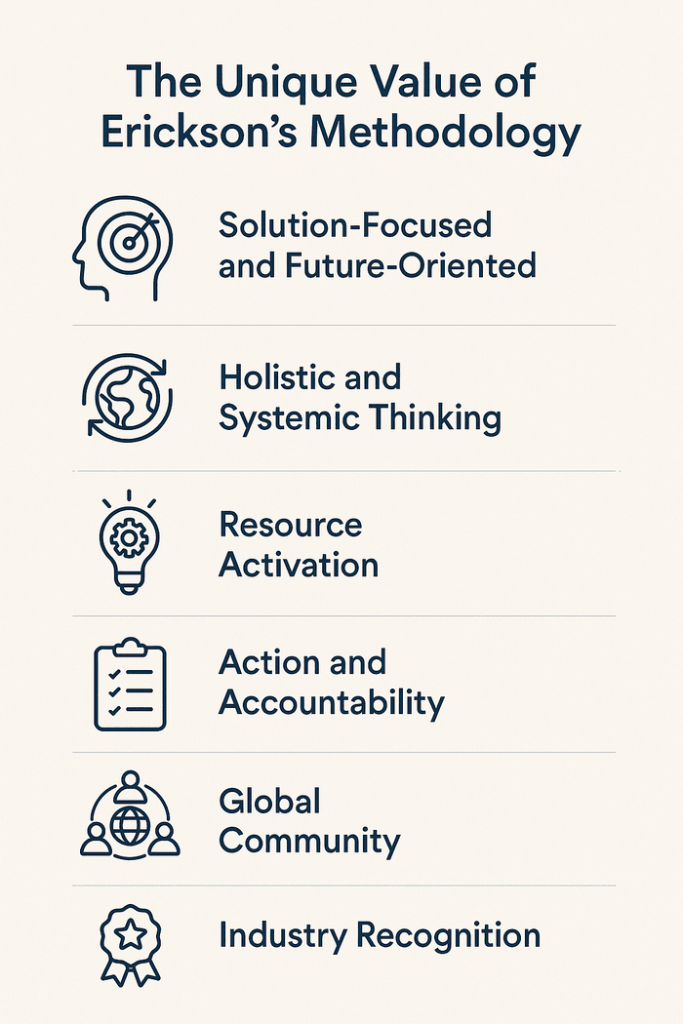
When searching for a certified life coach program price, it’s natural to start by comparing tuition fees. Aspiring coaches want...
Investing in yourself is one of the most important decisions you can make. For many Indian professionals contemplating Erickson Coaching International’s programmes—especially the flagship Art & Science of Coaching—a common concern is whether the financial and time commitment will pay dividends. Coaching programmes can run into thousands of dollars and require months of study; evaluating the return on investment (ROI) is essential. This comprehensive article delves into the tangible and intangible benefits of coaching, shares industry statistics and studies, examines the unique value of Erickson’s offerings and provides a decision framework to help you assess whether the investment is right for you.
Return on investment typically refers to the financial gains relative to costs. In coaching, ROI extends beyond revenue or salary; it encompasses increased self‑confidence, improved relationships, enhanced leadership skills, stress reduction and life satisfaction. According to recent coaching statistics, 99% of individuals and companies who hire a coach report being “satisfied or very satisfied,” and 96% say they would repeat the process. A majority of clients make back their financial investment: 68% of individuals recoup their investment with an average return of 3.44 times the amount spent. Moreover, 86% of companies that calculate ROI at least make back their investment; some report returns of 50 times or more. These figures demonstrate that coaching can generate substantial value when applied effectively.
The Art & Science of Coaching is offered in multiple formats—online, hybrid and in‑person. While exact fees vary by location and exchange rates, tuition for Level 1 and Level 2 combined typically ranges between ₹300,000 and ₹500,000, or more for fast‑track or international options. Additional expenses include mentor coaching, examination fees and ongoing professional development. Comparatively, this investment aligns with global coaching certifications and reflects the high calibre of training provided by Erickson’s faculty. When viewed in the context of professional development, the cost is comparable to an executive MBA module or a specialised postgraduate course.
Coaching is a booming industry. The global coaching market is estimated at $7.31 billion in 2025 and is projected to grow to $21.94 billion by 2032. The number of active coaches worldwide stands at around 167,700, and the average annual income for coaches in the United States is $67,800. While income figures vary widely by region and niche, these statistics indicate increasing demand. In India, coaching fees range from ₹3,000 to ₹10,000 per hour for personal clients and can exceed ₹15,000 per hour for executive coaching in corporate environments. Graduates who establish independent practices or secure corporate contracts can recoup programme costs within one to two years, depending on client volume.
For entrepreneurs and business leaders, coaching ROI manifests in improved productivity, clearer vision and stronger teams. Studies show that 51% of companies with a strong coaching culture report higher revenue than their industry peers. Another study found that executive coaching yields an ROI of 788%, factoring in productivity gains and employee satisfaction. These numbers suggest that coaching leads to better decision‑making, which directly impacts revenue and profitability.
Many professionals pursue coaching certification to advance within their organisations or switch to leadership roles. Having an ICF‑accredited credential signals mastery of communication, empathy and strategic thinking. Graduates frequently report promotions, salary increases or the ability to pivot into new industries. Beyond immediate financial gains, the certification boosts employability, provides networking opportunities and enhances credibility.
While financial returns are important, the intangible benefits of coaching often have the most profound impact. Clients frequently experience dramatic shifts in self‑perception and interpersonal dynamics. On an executive coach’s testimonial page, a client from a leading Indian bank shares that coaching “made me realise that the answers to my problems are within me” and that “my productivity increased and confidence sky‑rocketed”. Another client notes that their communication skills improved and confidence levels elevated after working with a coach. Such statements reflect a deeper ROI: the ability to trust oneself, articulate ideas and lead authentically.
Coaching encourages reflective questioning and systems thinking. Erickson’s approach emphasises focusing on desired outcomes rather than dwelling on problems. This shift allows professionals to make decisions aligned with long‑term visions. For example, Divya, an HR professional from our case study in the career path article, transitioned into executive coaching and used systems thinking to help clients navigate complex organisational challenges. Her new perspective increased her influence and opportunities, which translated into higher earnings.
Coaching fosters active listening, empathy and powerful questioning—skills that strengthen relationships with colleagues, clients and stakeholders. A testimonial from a corporate leader notes that a coach “has a structured way of uncovering challenges” and that sessions helped elevate communication skills. When leaders communicate clearly and inspire trust, teams perform better and retention improves.
Beyond performance metrics, coaching helps clients develop mindfulness and stress management strategies. One client described feeling physically and emotionally rejuvenated after coaching. Another said coaching boosted confidence to the next level and provided personalized tools to improve communication. Enhanced well‑being leads to sustainable productivity and reduces burnout—valuable outcomes that often outweigh the programme cost.

Erickson Coaching International distinguishes itself through several key features:
India’s coaching market is expanding rapidly. As technology and start‑ups transform sectors, professionals seek guidance for career transitions, leadership and entrepreneurship. Coaching fees in India are lower than in North America, making it more accessible. However, programme costs relative to local income require careful planning. Many participants finance their studies through savings, employer sponsorship or scholarships. When calculating ROI, compare the cost against potential earnings in rupees rather than dollar equivalents.
Indian workplaces are evolving from hierarchical structures to more collaborative, innovation‑driven cultures. Coaching skills help leaders foster psychological safety and encourage open dialogue. Erickson’s holistic approach resonates with collectivist values while encouraging personal accountability. Additionally, the global Erickson community provides exposure to diverse perspectives, which broadens cultural intelligence.
India’s population of young professionals is vast, and many are open to coaching for personal and professional growth. Building a coaching practice in India means tapping into a broad client base across multiple industries—technology, finance, education, healthcare and start‑ups. Networking within Erickson’s alumni base and the wider coaching community can accelerate client acquisition.
When evaluating whether Erickson’s coaching programmes are worth the investment, consider the following:
Even the best programme will not deliver ROI without proactive implementation. Here’s how to maximise your returns:
Practice coaching skills in real life—offer sessions to colleagues, friends or community members. The sooner you apply your skills, the sooner you gain confidence and results. Incorporating solution‑focused questions and systemic thinking in everyday conversations turns knowledge into mastery.
Develop metrics to evaluate progress. For personal clients, track improvements in goal achievement, well‑being and satisfaction. For corporate engagements, measure changes in productivity, retention, morale and revenue. Presenting these metrics to future clients demonstrates value and justifies your fees.
Attend alumni events, join study groups and partner with peers to co‑coach or refer clients. An Indian coach who collaborated with peers to run group programmes saw their client base triple within a year. The network multiplies your visibility and support.
Identify a niche where your background and interests intersect with market needs—such as leadership development for IT startups, wellness coaching for corporate executives or career coaching for women returning to the workforce. Specialisation positions you as an expert and commands higher fees.
Develop a professional website, invest in search‑engine‑optimised content and maintain an active LinkedIn presence. Share success stories (with client consent) and thought leadership. Offer free webinars or workshops to showcase your expertise.
Follow ICF’s Code of Ethics, which emphasises confidentiality, informed consent and responsible use of technology. Ethical behaviour builds trust, ensuring repeat business and referrals.
Case 1: Corporate Leader Turned Coach
Ravi, a senior sales director at a multinational firm in Mumbai, enrolled in Erickson’s programme to pivot into leadership coaching. He invested ₹450,000 and six months of weekend study. After certification, he offered pro bono sessions to colleagues and accumulated 100 coaching hours. Within a year, he signed a corporate contract worth ₹900,000 to coach high‑potential managers—a direct ROI of 2× his tuition. More importantly, coaching enhanced his communication and strategic thinking, leading to his own promotion to vice president.
Case 2: Entrepreneurial ROI
Ananya, an entrepreneur running a boutique design studio in Chennai, felt overwhelmed by managing employees and lacked long‑term vision. She invested in Erickson’s coaching programme to improve her leadership. During training, she used solution‑focused techniques to clarify her business goals and introduced coaching methods into team meetings. Within 18 months, revenue doubled, employee turnover dropped by 30%, and she was able to open a second studio. The ROI came through improved productivity, innovation and an empowered team rather than direct coaching fees.
Category | Cost/Investment | Tangible Benefits | Intangible Benefits |
|---|---|---|---|
Programme Fees | ₹3–5 lakhs tuition, mentor coaching and exam fees | Eligibility for ACC credential; access to global alumni network; certification recognition | Sense of accomplishment; structured learning environment |
Time Commitment | 6–12 months of study, practise and supervision | Ability to start coaching sooner; accelerated skill acquisition | Enhanced discipline; deeper self‑awareness |
Business Setup | Business registration, marketing costs, technology subscriptions | Revenue from clients, group programmes and corporate contracts | Confidence in marketing yourself; entrepreneurial mindset |
Continuous Development | Advanced courses (team coaching, NLP), supervision, conferences | Expanded offerings and higher fees; eligibility for PCC/MCC | Lifelong learning; peer support; staying ahead of industry trends |
Understanding that coaching delivers value is one thing; quantifying it is another. Business schools and consultants have developed frameworks for measuring training and coaching ROI. Two commonly used models are the Kirkpatrick Evaluation Model and the Phillips ROI Methodology.
At an individual level, you can track metrics such as salary increases, number of clients booked, hours saved through better time management or improvements in well‑being. Documenting baseline and post‑programme data provides evidence of the return.
Erickson is not the only player in the coaching education market. Prospective students often compare programmes based on accreditation, methodology, duration, cost and support.
Programme | Accreditation | Methodology | Duration & Flexibility | Community & Support | Relative Cost |
|---|---|---|---|---|---|
Erickson’s Art & Science of Coaching | ICF‑accredited ACTP | Solution‑focused, neuroscience‑informed, holistic and systemic | Modular structure; online, hybrid or in‑person options; Levels 1 & 2 provide 64–128 hours of training | Global alumni network; mentorship; active India chapter | Mid to high cost; scholarship options in India |
CoachU/Core Essentials | ICF‑accredited; originated in the USA | Coach‑centric, emphasising client awareness and accountability | 77 hours plus electives; teleclass format; flexible schedule | North‑American focus; smaller alumni network | Comparable cost but less emphasis on neuroscience |
ICF Professional Certified Coach (PCC) pathways | ICF‑accredited (various providers) | Depends on provider; may integrate ontological, somatic or cognitive approaches | Typically 125–200 hours; some are full‑time intensives | Varies; some programmes offer limited community beyond training | Cost varies widely; some cheaper but fewer support resources |
Local Indian institutes | May be ICF‑accredited or not | Range from motivational to corporate training models | Shorter workshops (30–60 hours); limited depth | Local network; less global exposure | Lower cost; variable quality |
Erickson’s strengths lie in its solution‑focused methodology, neuroscience underpinnings, global recognition and active alumni community. When evaluating alternatives, weigh whether a programme’s curriculum aligns with your values and long‑term goals. Cheaper programmes might save money upfront but provide less depth or market recognition.
Although ROI calculations often focus on the first year or two after certification, coaching yields benefits over decades. Neuroplasticity—the brain’s ability to reorganise itself—means that learning coaching skills transforms how you think and interact long term. Practicing solution‑focused questioning, active listening and accountability builds neural pathways that enhance problem‑solving and empathy. These skills improve relationships with family, friends and colleagues, creating ripples of positive change.
For many graduates, the most significant long‑term return is a renewed sense of purpose. Coaching encourages you to reflect on your values, strengths and vision. As you help clients unlock their potential, you simultaneously grow as a person. Alumni often report feeling more fulfilled, connected and resilient, even years after completing the programme.
Case 3: ROI for a Manufacturing Company
An Indian manufacturing firm with 500 employees hired an Erickson‑trained coach to implement a leadership development programme for plant managers. The coaching initiative cost ₹1.5 million, including individual coaching sessions, group workshops and follow‑up evaluations. Over the next 18 months, the company observed a 12% increase in production efficiency, a 25% reduction in accidents and a 15% decrease in employee turnover. Using conservative estimates, the financial benefits (through increased output and reduced hiring costs) were valued at ₹7 million. After subtracting the programme cost, the ROI was approximately 366%. Managers reported higher morale, improved communication and stronger problem‑solving skills, while staff noted that leaders were more approachable and supportive.
Many Erickson alumni use their skills for social good. Pro‑bono coaching for non‑profits, mentoring under‑resourced youth and facilitating community dialogues are common. By empowering individuals from diverse backgrounds, coaches contribute to social equity and community resilience. The Erickson India team often organises community coaching events and webinars to raise awareness about mental health, goal setting and leadership. These initiatives may not have a direct monetary ROI but generate profound societal value and personal satisfaction.
India’s coaching landscape is set for rapid expansion. The country’s youth demographic, burgeoning start‑up ecosystem and increasing focus on mental health create fertile ground for coaching. Government initiatives promoting entrepreneurship and skill development further amplify demand. As more organisations adopt coaching cultures, opportunities for certified coaches will multiply. Graduates who position themselves early in emerging niches—such as sustainability coaching, diversity and inclusion coaching or neurodiversity coaching—can capture market share. Awareness campaigns emphasising coaching ROI and success stories can accelerate acceptance and investment.
While coaching may seem like a luxury, the ROI statistics and success stories show that it is a powerful tool for addressing critical professional and personal challenges. Many organisations now allocate budgets for leadership development and coaching because they see measurable returns. Individuals often recover their investment through promotions or new business opportunities.
With around 167,700 active coaches worldwide and a population of over 1.4 billion in India, the market is far from saturated. Unique niches and underserved communities remain. Moreover, quality matters more than quantity. Coaches who invest in accredited training and continuous development distinguish themselves.
While there is abundant free content, structured programmes like Erickson’s provide comprehensive frameworks, feedback, supervised practise and an internationally recognised credential. The combination of solution‑focused methodology, neuroscience grounding and global community is difficult to replicate through ad‑hoc learning.
Ultimately, the ROI of Erickson’s coaching programmes depends on your goals, commitment and application. If you desire to become a professional coach, integrate coaching skills into leadership, or transform your business, the investment can yield significant financial returns, career advancement and personal growth. The coaching industry’s impressive statistics—high satisfaction rates, strong financial ROI and growing demand—provide compelling evidence. Erickson’s approach stands out for its solution focus, systemic perspective and global network. For Indian professionals navigating rapid economic and cultural change, coaching is not just a luxury; it is a strategic advantage. Evaluate your readiness, talk to alumni, plan your finances and, if aligned with your aspirations, take the step. The returns—both tangible and transformative—may far exceed your expectations.
Tuition for Levels 1 and 2 combined ranges from ₹300,000 to ₹500,000, depending on format (online, hybrid, or in-person). Additional costs include mentor coaching (₹50,000–₹1,00,000) and ICF application fees (₹15,000–₹65,000), with total investment around ₹4,00,000–₹7,00,000.
The global coaching market is valued at approximately USD 5.34 billion in 2025, projected to reach USD 7.3–8.4 billion by 2030 with a 9.6–17% CAGR. In India, this growth drives demand for certified coaches in tech, startups, and corporate sectors, enabling higher fees (₹3,000–₹15,000/hour) and career opportunities.
68% of individuals recoup costs with a 3.44x average ROI, while 86% of companies report at least breaking even, with some achieving 7x–50x returns through productivity gains and revenue growth. For Indian professionals, this translates to salary increases, promotions, or business revenue doubling within 1–2 years.
Graduates experience boosted confidence, improved communication and decision-making, enhanced leadership skills, reduced stress, and greater self-awareness. Testimonials highlight "sky-rocketing confidence" and "rejuvenated well-being," leading to stronger relationships and a renewed sense of purpose.
Apply skills immediately through pro bono sessions, leverage Erickson's 55,000+ alumni network for referrals, specialize in niches like executive or wellness coaching, track client outcomes for testimonials, and pursue ICF credentials (ACC/PCC) to access corporate contracts and higher fees.

When searching for a certified life coach program price, it’s natural to start by comparing tuition fees. Aspiring coaches want...

Neuro-Linguistic Programming (NLP) is experiencing a resurgence in India. Social media, workshops and high-energy seminars promise instant breakthroughs by rewiring...

Many professionals pursue the title of Certified Organizational Development Coach with the expectation that a credential alone will open corporate...

Some providers offer to fast-track you to PCC status through purely online modules for a fraction of the cost of...

Executive coaching has evolved from a niche service for struggling leaders into a strategic investment for organisations aiming to build...

When prospective coaches research training options, cost is often the first number they look for. A quick internet search produces...

Deciding to invest in life coach training programmes can be a transformative milestone in your personal and professional journey. In...

Choosing the right online life coaching courses can be one of the most transformative decisions you ever make.

The demand for personal and professional growth has never been higher. As more people seek guidance on careers, relationships and...